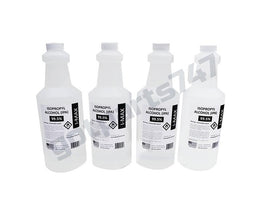Isopropyl Alcohol, otherwise known as rubbing alcohol, is well used in a wide range of different industries. It offers a wealth of benefits as an antiseptic, a disinfectant and an affordable solvent. But it must be used in accordance with manufacturer’s guidelines, as it can soon become a dangerous substance when used incorrectly.
Before using Isopropyl Alcohol solutions, it’s best to read up on the different hazards associated with these solutions, to ensure that you won’t fall foul of any of the associated risks. Read on to learn more about the dangers of Isopropyl Alcohol, and find out what you need to avoid while using rubbing alcohol solutions.
Isopropyl Alcohol: What are the possible side effects on skin?
If large amounts of Isopropyl Alcohol are accidentally spilled on the skin, there can be potentially serious side effects. This is largely due to the fact that Isopropyl Alcohol is so easily absorbed. As a result, spilling a large amount on the skin can lead to Isopropyl Alcohol poisoning.
Harm can also be caused by repeated exposure to Isopropyl Alcohol on the skin, even if the amounts are smaller. In such cases, there is a risk of itching, redness and dry or cracked skin. So, Isopropyl Alcohol must be handled with care, and those working with solutions regularly are advised to wear protective equipment to prevent contact with the skin as much as possible.
What happens if you inhale Isopropyl Alcohol?
Isopropyl Alcohol is dangerous if inhaled, particularly when large amounts of the substance are inhaled in a short period of time. If this occurs, the effects might include nausea, vomiting and irritation of the nose and throat.
Many people use Isopropyl Alcohol in their day to day jobs, and will therefore be at risk of repeated exposure to Isopropyl Alcohol inhalation. Symptoms of inhalation to be aware of in these cases include headaches, dizziness and confusion. If any of these symptoms occur, medical treatment should be sought urgently.
If the inhalation of Isopropyl Alcohol continues, it can lead to increasingly serious symptoms. The worst cases of Isopropyl Alcohol inhalation can cause breathing difficulties and even death through Isopropyl Alcohol poisoning.
Ingesting Isopropyl Alcohol
Ingesting Isopropyl Alcohol is incredibly dangerous. When ingested, the substance quickly affects the central nervous system, causing a range of symptoms which quickly escalate in seriousness. Initially, the solutions will affect a person’s heartbeat, breathing and gag reflex. These may be slowed by the ingestion of Isopropyl Alcohol, or they could even be stopped altogether.
The strength of Isopropyl Alcohol solutions is such that ingesting them can also lead to hypothermia and cardiac arrest, as well as blood thinning and a significant reduction in blood sugar levels, which can cause seizures.
It’s important that Isopropyl Alcohol are always clearly labelled, and that they are never kept in containers that could lead to them being mistaken for drinks. They should also be kept well away from any food preparation areas, to avoid the risk of accidental consumption.
Is Isopropyl Alcohol Flammable?
Due to the high alcohol content of Isopropyl Alcohol, it’s a particularly flammable substance which can ignite quickly. So, those handling Isopropyl Alcohol solutions must be aware of the fire risks associated with them. Isopropyl Alcohol solutions should always be kept well away from any heat sources, sparks or flames, and they must be stored separately from strong oxidizers such as chlorine, acids and isocyanates.
It’s not just the solution itself that must be kept away from sources of ignition. The vapours of Isopropyl Alcohol are also flammable, and can quickly cause a fire if they come into contact with any ignition sources. We always recommend that Isopropyl Alcohol is stored in a safety cabinet for this reason.
What are the signs of Isopropyl Alcohol Poisoning?
If a person has been accidentally poisoned by Isopropyl Alcohol, or has ingested the substance voluntarily, the symptoms tend to come on within a few hours. The seriousness of the symptoms, and the time in which they take to appear, depend on the amount of the solution that has been consumed and the timeframe of ingestion. Symptoms can also vary according to the types of Isopropyl Alcohol that have been ingested, and whether it has been inhaled, absorbed through the skin or consumed.
Typical symptoms of Isopropyl Alcohol poisoning include dizziness, low blood pressure, pain in the stomach, a rapid heart rate, a low body temperature, slurred speech and slowed breathing. Other symptoms might include nausea, vomiting and slow or unresponsive reflexes. A person may even fall into a coma as a result, and the worst cases can result in death.
---
Isopropyl Alcohol is a potentially dangerous substance, so it must be handled with extreme care in any setting. For more information about Isopropyl Alcohol and how best to protect your staff from its associated risks, don’t hesitate to get in touch with our team.

